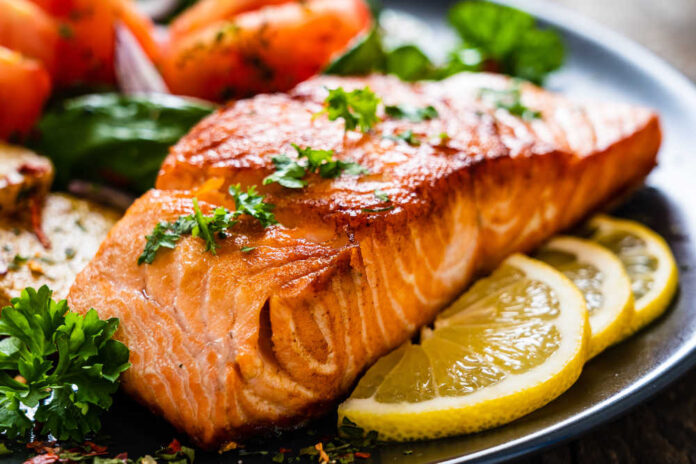
Although multivitamin supplements can be useful in cases of nutrient deficiency and eating difficulties, they are generally unnecessary for most people.
It is nearly always better to get your nutrients from whole foods rather than supplements. In fact, not only have vitamin supplements been shown to have limited effectiveness, some can be potentially harmful to your health.
Instead of taking a daily multivitamin, focus on eating a nutrient-rich diet that includes foods such as:
Seafood
Seafood is an excellent source of vitamins, minerals, and omega-3 fatty acids.
Salmon is a popular choice, as it is relatively affordable, easy to find, and incredibly nutritious.
Tuna, mackerel, cod, sardines, and shellfish are excellent seafood options for getting various essential vitamins and nutrients.
Plus, the omega 3s in seafood have been linked to numerous health benefits, including a reduced risk for heart disease and stroke, improved cognitive function, and better joint health.
You should also consider adding some seaweed into your diet. Seaweed contains high amounts of calcium, iron, magnesium, and manganese. It also provides iodine—one of the most common nutrient deficiencies affecting nearly one-third of the global population.
Dark, Leafy Greens
Dark green leafy vegetables are some of the most nutrient-dense foods you can get.
They are an excellent source of vitamins A, C, and K, as well as folic acid, iron, magnesium, and calcium.
Some of the best dark, leafy greens to eat include spinach, kale, collard greens, and Swiss chard.
One reason it’s better to get your nutrients from leafy greens instead of vitamin pills is that these veggies also contain fiber, antioxidants, and other health-promoting compounds. This will help you absorb the nutrients better and reduce the likelihood of any side effects.
Bell Peppers
When you think of vitamin C, there’s a good chance that you think of oranges first. It may surprise you that bell peppers contain about four times as much vitamin C as oranges.
With just a few bites of pepper (approximately 1/6th of one large pepper), you can get 100% of your Recommended Daily Intake (RDI) of vitamin C.
Bell peppers are also a good source of vitamins B6 and E and carotenoids like beta-carotene and lycopene. These nutrients are important for maintaining healthy skin, eyesight, and a strong immune system.
Nuts and Seeds
Nuts and seeds are packed with all sorts of nutrients that are essential for good health.
Each type of nut and seed has a different nutrient profile, but generally, they are rich in B vitamins, vitamin E, iron, zinc, magnesium, phosphorus, calcium, copper, and potassium.
Additionally, they’ll provide lots of protein, fiber, and unsaturated fats, which make them very filling. This means you’ll get abundant nutrition without risking overeating and consuming too many calories.
Some of the best nuts and seeds to eat include almonds, cashews, walnuts, flaxseeds, chia seeds, and pumpkin seeds.






















